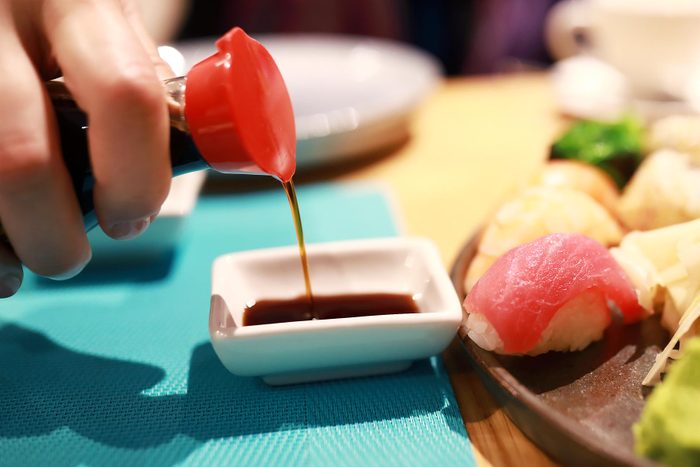Here’s How Much Sodium Is in Soy Sauce, with a Kidney Doctor’s Wisdom
Updated: Sep. 08, 2023

Watching your salt intake? Here's how too much soy sauce can impact your heart and kidneys "without even thinking," says a urologist.
There’s nothing quite like that bitey hit of soy sauce and wasabi, or a soy sauce-based salmon marinade with a little ginger, garlic, and brown sugar. A serving of soy sauce pours on big flavor to foods that can be favorable for your health, like fish, rice and veggies.
It’s important to bear in mind that soy sauce can also add a lot of something else: Salt. For people watching their sodium intake, like folks at risk for heart or kidney disease, that can be a problem. Traditionally brewed soy sauce is incredibly high in sodium.
How much sodium do you need?
“Let’s be clear, your body needs some sodium in order to function properly,” says S. Adam Ramin, MD, a Los Angeles-based urologist and assistant professor of surgery at City of Hope National Medical Center. “However, most or all of what your body needs can already be found in a large number of fruits and vegetables.”
When you add extra salt, say by pouring some soy sauce over those veggies, it can easily take you over the limit—about 2,300 milligrams (mg), which equates to one teaspoon of salt per day, according to the current US Dietary Guidelines for Americans. Dr. Ramin suggests that if that doesn’t sound like much, it’s because it’s not.
13 Foods With Way More Sodium Than You Realized
How much sodium is in soy sauce?
The amount of sodium in soy sauce can vary depending on the brand and type of soy sauce. However, traditionally brewed soy sauce typically is very high in sodium. On average, regular soy sauce contains around 920 to 1,160 milligrams of sodium per tablespoon. If you’re not careful, that mini bowl of soy sauce could lead you to eat more than half your recommended daily intake of salt, or more.
“We tend to grab seasoning, like the salt shaker or the bottle of soy sauce, and use it to season our foods without even thinking,” Dr. Ramin says.
If that sounds familiar, reduced-sodium versions of soy sauce are also available. These generally contain around 500 to 600 milligrams of sodium per tablespoon…and still pack plenty of flavor.
7 Clear Signs You’re Eating Too Much Salt
The problem with eating too much soy sauce
The problem is that when you eat too much salt, the kidneys respond by retaining water in order to dilute it, Dr. Ramin explains. This is a protective measure that helps balance the chemical levels of the blood stream, which is required to keep our hearts in working order.
“This much stress on the kidneys can cause damage to them and to the heart muscle over time,” he says, adding that this is true even in healthy people.
Eat soy sauce in moderation
It’s OK to occasionally add a teaspoon or two of soy sauce on your food as long as you’re keeping an eye on the serving size and not just pouring it indiscriminately all over your food.
“Better yet,” Dr. Ramin says, “next time you sit down at a meal, taste your food before adding soy sauce and see if it even needs it. If it needs a little something more, add just a dash. Or choose a low-sodium alternative.”
Get The Healthy @Reader’s Digest newsletter and follow The Healthy on Facebook and Instagram. Keep reading:





















